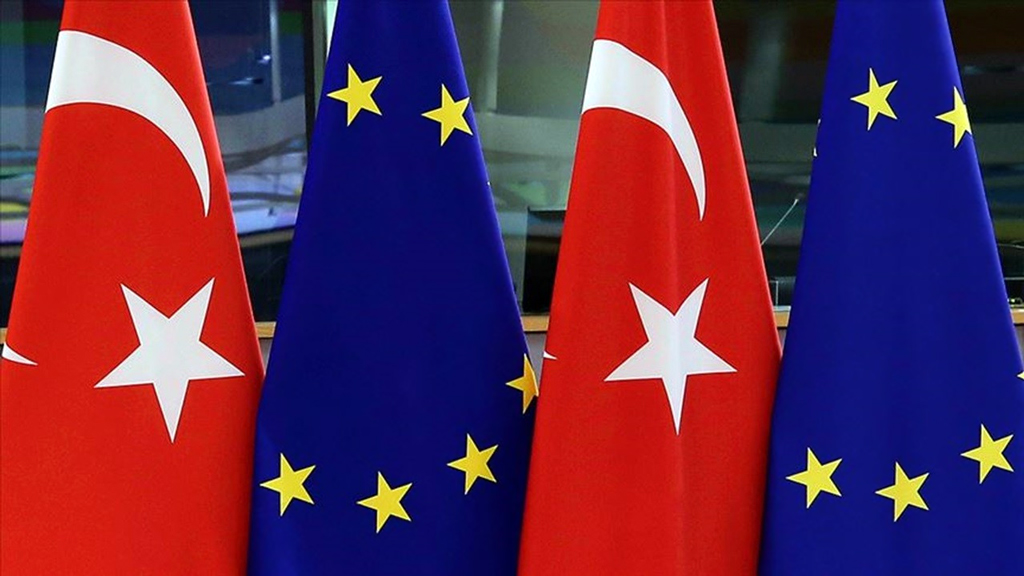Europe’s performance on liberal values has been so bad that some liberals in the European press have complained about not being able to “respond as harshly as anticipated” to Turkey’s withdrawal from the Istanbul Convention; the EU is well aware that any reaction to Turkey based on this withdrawal would not be taken seriously because Hungary, a member country, has also withdrawn from the same convention.Economic ties and the migration issue are two areas of cooperation that give some rays of hope amid Turkey and the EU’s deadlocked agenda. It is known that talks for the renewal of the March 18 Statement, which was signed in 2016, have been going on for quite some time. Immigration and economic cooperation It is worth remembering at this point that the statement in question is not just about migration; just one part of this statement deals with migration. The relationship between the EU and Turkey was tense at the time the statement was signed, and it still is today. Although the parties saw this agreement as an opportunity to solve the migration issue, they also saw it as an opportunity to strengthen bilateral relations through mutual promises. The statement placed a number of obligations on the EU in this regard, including revision of the Customs Union and visa liberalization. In fact, with the statement, the responsibilities stemming from migration would be shared between the two parties. The EU, however, failed to uphold its commitments in this process, as it followed the highly lucrative strategy of providing Turkey with only a small amount of monetary assistance, which was then strictly controlled and spent solely according to its terms. Visa liberalization, promised for Turkish citizens, never took place. The Customs Union revision was also not made. Despite the failure of the promised burden sharing, Turkey continues to host and support migrants. Turkey has learned its lessons from these shared experiences on migration with the EU. As a result of these experiences, Ankara demands that the agreement be renewed and its non-functional sections be reformed, since the existing arrangement is simply not functioning. Despite allocating the promised 3+3-billion-euro budget for refugees, the actual transfer of this amount to individual projects is sluggish, to the point that one believes the slowness is intentional. The EU’s sole control of refugee funds causes serious problems on the ground. The EU’s intermediary organizations, which lack adequate knowledge of the Turkish field, spend more than required on administrative tasks most of the time, causing problems in the money reaching the refugees, who are the primary beneficiaries of the allocated funds. Although these institutions should have been working to reinforce local Turkish and Syrian NGOs by sharing their experiences, they seem to be stuck in a “closed-circuit”, vicious bureaucratic cycle. The EU’s attempts to handle refugee funds according to the logic of IPA (Instrument for Pre-Accession Assistance) development funds have been slowing down the process. For this reason, the renewed agreement should, first and foremost, grant authorization to Turkish organizations commensurate with their obligations. Turkish institutions should play a greater role in the management of funds and money management should be conducted jointly. While providing funds on paper, the EU has been slowing down projects through bureaucratic means in order not to transfer any more of the already allocated funds; it is high time such strategies were abandoned.
Aside from that, Turkey is accountable to its citizens due to the massive migration burden it has been carrying. For this reason, the EU should fulfill its commitments regarding the revision of the Customs Union and visa liberalization, as stipulated in the statement. As a matter of fact, the EU was forced to respond to Turkey’s legitimate demand regarding the Customs Union.The EU Leaders Summit approved the revision of the Customs Union while also inviting Turkey to “talks” about visa liberalization. When we examine the decisions that came out of the summit on Turkey, we find an overall positive language. Nonetheless, still quite noteworthy is the fact that there are conditions attached and that if the conditions are not met, the pledges can be retracted. Although this is a positive development, given the pledges that were made in the March 18 Statement but have not been fulfilled, the Turkish side must proceed with caution, since the EU, in its Turkey policy, has long been engaged in a tactic of buying time and stalling, based on the logic of “a little carrot, a little stick.” The pledges made on resuming the financial support delivered so far for refugees and the emphasis made on cooperation between the parties can only be taken seriously once tangible steps have been taken. For example, the establishment of safe zones, which Turkey has advocated for a long time as part of its strategy for the safe return of refugees, should be supported logistically and politically by the EU, which should also enable the use of its funds in this field as well.
The migration issue will not end in Turkey, just as it did not begin here. Europe and Turkey must work together. Turkey’s borders are the Easternmost borders of Europe and so its security is of vital importance to the EU. Therefore, the policy that Turkey has been pursuing along its borders and in Syria in order to establish stability should be supported.New policy on Turkey for another time Unfortunately, we see that there are ongoing efforts to discredit Turkey’s achievements in the field of migration by the use of certain narratives. In order to cover up their own mistakes and sins, certain groups in the EU have been accusing Turkey of instrumentalizing the migration policy and using it as a tool against Europe. Even more worrisome are the efforts of certain groups in Turkey to peddle these narratives with political agendas in order to put the current government of Turkey in a difficult position. Turkey, which adopted a humanitarian attitude in the Syrian crisis by opening its borders, had previously done the same for Iraqis escaping American bombardments in their country and Kurds fleeing Daesh.
Turkey’s humanitarian approach and management success in the area of migration put European countries to shame. So much so that European media outlets and politicians, who routinely blame Turkey for human rights violations, have largely ignored Turkey’s achievements and attitude in the area of migration, effectively concealing them from their own publics.The reason for this behavior is that the discourse that the principles of human rights and rule of law determine European politics contradicts the European policy of keeping refugees out of their borders at the expense of their lives. On the other hand, the Turkish state and society’s humanitarian approach to migration, though they are regularly accused of human rights violations, clearly demonstrates that these allegations are political. The reasons that the 27 EU countries have been pursuing a policy of pushing back migrants are political in nature and cannot be explained solely on the basis of economic considerations. Nobody can argue that Turkey, Iran, and Lebanon, the countries that have welcomed the most refugees, are economically stronger than Europe. However, with Germany partly excluded, it is quite reasonable to conclude that EU member states have turned this matter into a crisis through a serious lack of political will and incompetence.
As areas of cooperation with Turkey, economy, and migration were most prominent at the EU Leaders Summit. However, we should not anticipate any new Turkey policy from the EU, or any major moves for that matter, positive or negative. The EU has once again chosen to “defer” the “Turkey issue”, simply because the source of all tensions with Turkey is political.While the EU cooperates in a number of compulsory areas, relations will neither be broken nor strengthened until Turkey elects a government that is not perceived as a hindrance to EU interests prevailing there. It is so obvious that the EU’s outdated Turkey policy has failed, and a new Turkey policy is urgently needed under new circumstances since Turkey’s foreign policies that prioritize its own interests belong not to the ruling government but to the Turkish state itself, contrary to the claims of mainstream European politicians and media. For this reason, all economic and social cooperation between the EU and Turkey is bound to be overshadowed before the EU addresses its long-standing problem of not treating Turkey as an equal partner. The EU and Turkey have inseparable ties with each other, both socially and economically. These long-standing ties need a stable future. In the management of EU-Turkey relations, a rational attitude is needed, as well as a win-win strategy.
Unless Turkey-EU relations become established on stable political foundations, any attempt at cooperation in the fields of economy and migration will eventually fail. Additionally, unless the EU respects Turkey’s independent will to protect its own interests, it is unlikely that their relations will grow into a stable cooperation in the long run. But given the EU’s attitude thus far, we may argue that anticipating a new and big Turkey strategy from Europe before 2023 is unrealistic and that the EU is simply trying to buy more time against Turkey.
[AA, March 26 2021]









